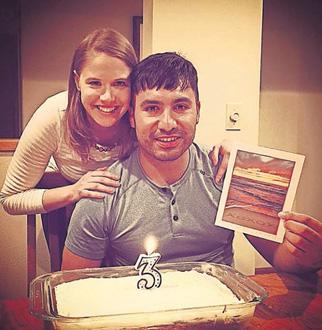試す 金 - 無料
I believe that Ricky's law has saved lives, it has changed lives, restored families'
The Guardian Weekly
|May 24, 2024
Ricky Klausmeyer-Garcia’s friends struggled to get him addiction treatment, leading to the creation of alawin his name. Buta year after his death, profound questions remain about how best to help those with substance use disorder in the US.

Sitting at his dining room table, Kelsey Klausmeyer, 41, looks at a picture of his late husband, Enrique Klausmeyer-Garcia, known to most as Ricky. He died almost exactly a year ago, at the age of 37. Kelsey can't make sense of it. When they met, Kelsey was awed by Ricky's story: his long battle with addiction, his years of sobriety, his advocacy for recovery. Now, after his death and in the midst of a nationwide addiction crisis, the narrative around Ricky's life is less tidy.
Ricky is the inspiration for a Washington state law - known as Ricky's law passed in 2017 that enables loved ones and public safety officials to compel people experiencing substance abuse to undergo treatment, even if they are unable or unwilling to consent to it themselves.
The US has been experimenting with these forcedcommitment laws for decades. The debate over their efficacy, practicality and ethicality is seeing renewed urgency in states such as New York, California and Washington, where addiction and severe mental health disorders have become a highly visible and highly political issue.

Ricky's story brings into sharp relief one of the fundamental and difficult questions that officials in these places are grappling with: to what extent should society override an individual's rights in the name of saving their life and protecting public safety? For Kelsey, Ricky's story is not primarily about public policy. It's a story of immense personal joy and loss, laid before him in a handful of pictures. Here they are with their dog, Otis, whom Ricky "treated like our child", chuckles Kelsey. Here they are in 2022 on their wedding day, both smiling, fit and handsome at a sunny mountain resort 90 minutes from their home in Seattle. Two hundred of their friends and family came to spend three days celebrating.
このストーリーは、The Guardian Weekly の May 24, 2024 版からのものです。
Magzter GOLD を購読すると、厳選された何千ものプレミアム記事や、10,000 以上の雑誌や新聞にアクセスできます。
すでに購読者ですか? サインイン
The Guardian Weekly からのその他のストーリー

The Guardian Weekly
Help at hand: A wave of support after school shooting
When Jim Caruso heard the news of the school shooting in Tumbler Ridge, he knew immediately he needed to be there. He packed his bags and boarded a plane for the community 1,100km away. \"I wanted to be here to bring some level of comfort,\" he said. \"I wanted to hug people, pray for them and, most importantly, to cry with them.\"
3 mins
February 20, 2026

The Guardian Weekly
From rickshaws to running shoes in pursuit of trail glory
Members of a local athletics club who transport passengers for a living are now beating elite athletes in international endurance events
3 mins
February 20, 2026

The Guardian Weekly
AI therapy Patients turn to chatbots for treatment
On a quiet evening in her Abuja hotel, Joy Adeboye, 23, sits on her bed clutching her phone, her mind racing.
2 mins
February 20, 2026
The Guardian Weekly
In these dark times, the World Service must not be allowed to fall silent
“The programmes will neither be very interesting nor very good,” said the then BBC director general John Reith when he launched its Empire Service in December 1932.
2 mins
February 20, 2026

The Guardian Weekly
Everybody wants to be a cat
Genre-hopping bass virtuoso Thundercat discusses Snoop Dogg and Star Wars ahead of the release of his fifth album
7 mins
February 20, 2026

The Guardian Weekly
'Just say no' US politicians offer advice on how to repel Trump
In Munich, Democrats put an end to tradition of the united front to stand among the president's fiercest critics
3 mins
February 20, 2026

The Guardian Weekly
Bird is the word: the secret to serving up perfect roast chicken
What’s the best way to roast a chicken?
2 mins
February 20, 2026

The Guardian Weekly
Sphere we go!
How did an industrial estate in Leipzig end up home to the great Brazilian architect Oscar Niemeyer's final project? Take a seat in his eye-popping restaurant
4 mins
February 20, 2026

The Guardian Weekly
What the repeal of a key climate rule means for America
The Trump administration has dismantled the basis for all US climate regulations, in its most confrontational anti-environment move yet.
2 mins
February 20, 2026

The Guardian Weekly
I could look out the window all day - so no need for curtains
I've never needed to be convinced of the cognitive benefits of looking out the window.
2 mins
February 20, 2026
Listen
Translate
Change font size
